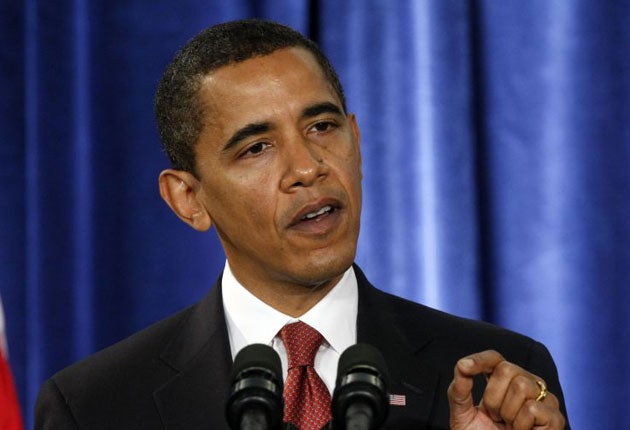Obama plans massive economic rescue package

Your support helps us to tell the story
From reproductive rights to climate change to Big Tech, The Independent is on the ground when the story is developing. Whether it's investigating the financials of Elon Musk's pro-Trump PAC or producing our latest documentary, 'The A Word', which shines a light on the American women fighting for reproductive rights, we know how important it is to parse out the facts from the messaging.
At such a critical moment in US history, we need reporters on the ground. Your donation allows us to keep sending journalists to speak to both sides of the story.
The Independent is trusted by Americans across the entire political spectrum. And unlike many other quality news outlets, we choose not to lock Americans out of our reporting and analysis with paywalls. We believe quality journalism should be available to everyone, paid for by those who can afford it.
Your support makes all the difference.President-elect Barack Obama and Congressional Democrats are laying the groundwork for quick enactment in January of a giant, two-year economic rescue package that will total about a half-trillion dollars.
His economic team in place, Obama has tasked his aides with assembling an ambitious measure to pump money swiftly into the battered economy, but also create 2.5 million new jobs, send a tax cut to the poor and middle class, and make massive government investments in energy-saving and other technologies designed to pay for themselves in the long run.
Some senior Democratic lawmakers put the cost of the package as high as $700bn (£456bn), a figure Obama's team calls premature and several Democratic aides said was unlikely. One top Democratic congressional official said it will probably cost between $400bn and $500bn over two years.
The package would worsen an already swollen US deficit and Obama said he planned a news conference today to discuss the need "to scour our federal budget, line-by-line, and make meaningful cuts and sacrifices as well."
Obama named New York Federal Reserve President Tim Geithner the next treasury secretary at a Monday press conference, where he said the United States faces a "crisis of historic proportions" and played down expectations his administration could put the brakes on quickly.
He also named Lawrence Summers as director of his National Economic Council. Summers was treasury secretary under former President Bill Clinton and is a former president of Harvard University.
Democratic officials said Obama today would name Peter Orszag as his budget director, turning to Congress' chief adviser on spending and taxes as he fills out his economic team. Orszag, 39, is serving a four-year term as head of the Congressional Budget Office.
The president-elect has acknowledged that the price tag of his rescue package will be far higher than the $175bn economic aid plan he advocated while he was campaigning for the White House.
"We have to make sure that the stimulus is significant enough that it really gives a jolt to the economy, that it is putting people back to work, that it is making investments, that it is restoring some confidence in the business community that, in fact, their products and services are going to have customers," Obama said Monday as he announced his economic team.
Declining repeatedly to estimate the cost of the plan, Obama said, "It's going to be costly."
Democratic congressional leaders have been pressing for months for another "stimulus" plan to follow the $168bn package of tax rebates enacted in February. In a statement Monday praising Obama's economic team, Democratic House Speaker Nancy Pelosi said President George W. Bush and congressional Republicans should agree to a second economic aid plan before the year's end, to "provide a down payment on new job-creating infrastructure investments, help states avoid deep cuts to health care and other essential services, and provide nutrition assistance to struggling families."
But there's little chance that Bush and the Democratic Congress will reach a breakthrough on such a measure. Instead, Obama's team and Democratic leaders are hard at work on Plan B: The new Congress that convenes in early January will move swiftly on an aid package, readying it for Obama's signature as one of his first acts after being inaugurated.
The measure is likely to a beefed-up version of a $61bn stimulus plan the House passed in September, which included $37bn in spending on public works projects such as road-building and water and sewage projects; about $15bn in aid to cash-strapped states to guard against cuts to health care for the poor; a $3bn boost in food stamp aid; and a $7bn jobless benefits extension for unemployed workers whose payments would otherwise run out.
Join our commenting forum
Join thought-provoking conversations, follow other Independent readers and see their replies
Comments